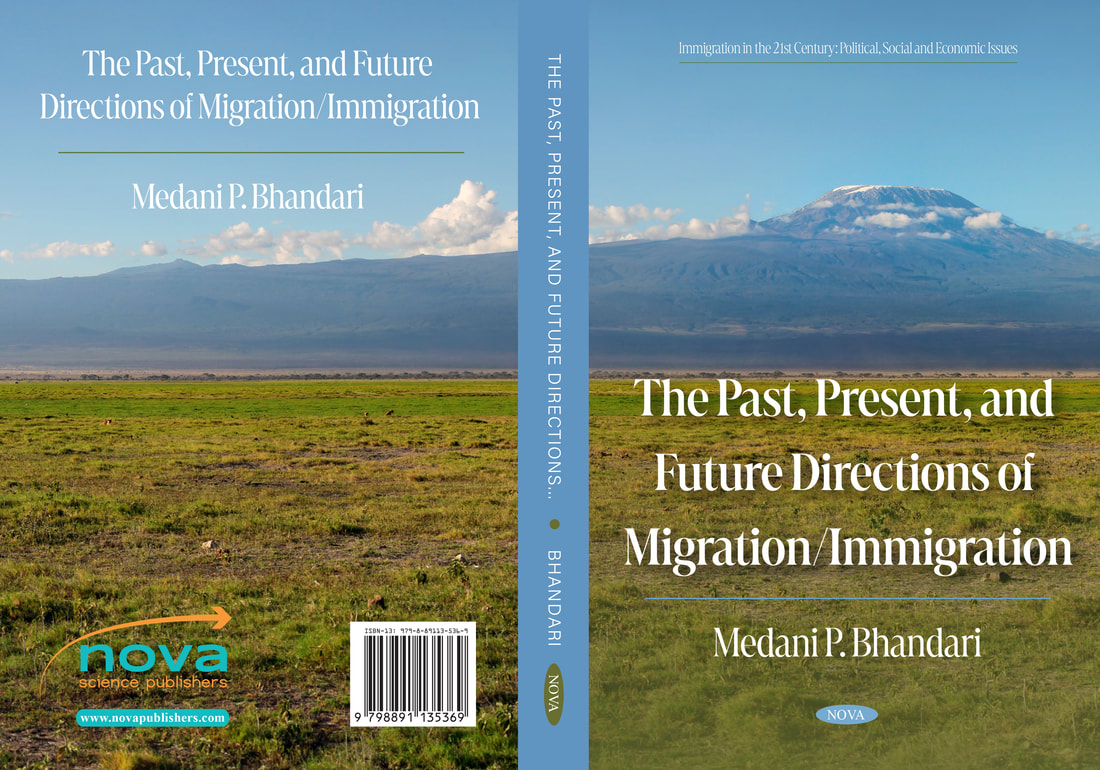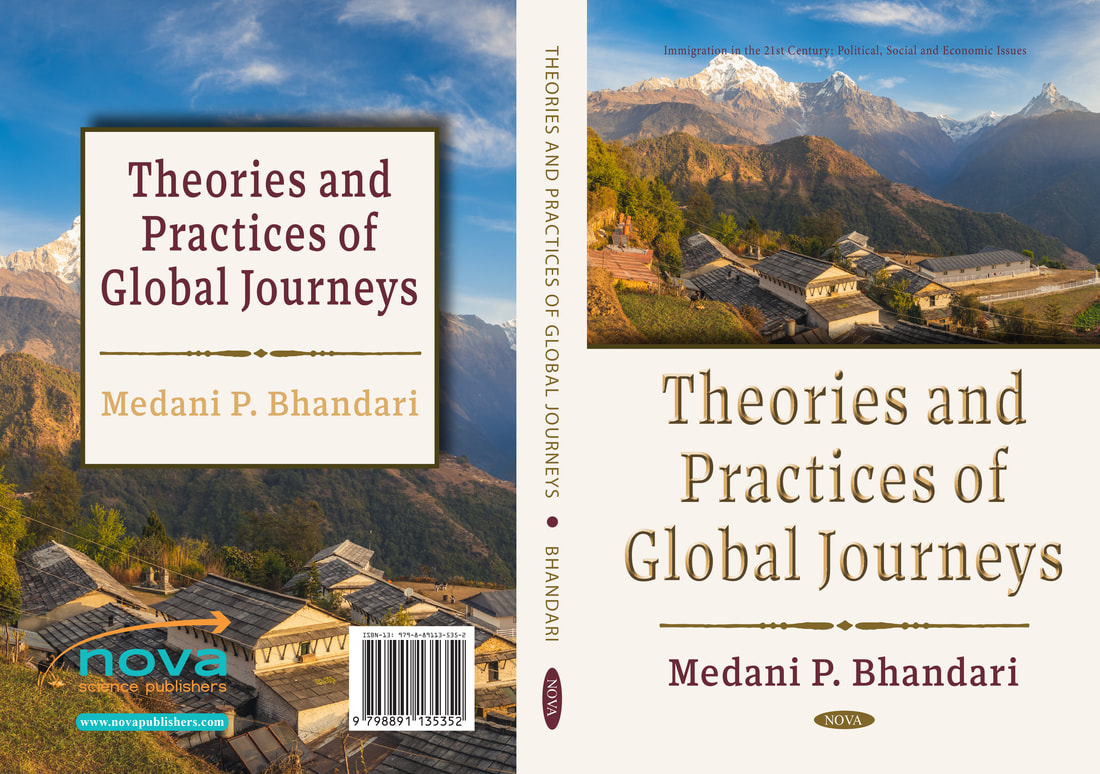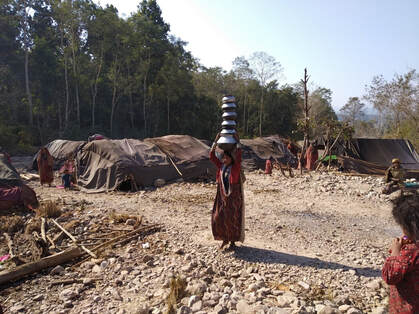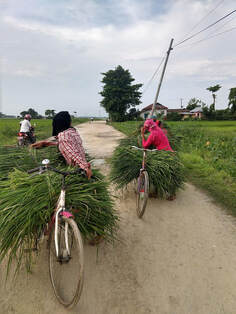Research & Scholarship
|
AU Research Integrity & Resources
Click Here Summary Page 2022 Compiled by Dr. Melinda Connor, PhD, Executive Director of AU Research AU Research Code of Ethics Statement |
Use ERIC - a highly respected research site.
Standard to all doctoral students - for free.
https://eric.ed.gov/?faq
Standard to all doctoral students - for free.
https://eric.ed.gov/?faq
Akamai's Research Philosophy
Akamai University understands and supports the need for research on all fronts of the human experience, from the arts and humanities, religious and spiritual arenas of ideas, to the concrete world of hard political and business decisions. The scope of our faculty and student research reaches from the realm of public health and disease control to the recognition of the whole person in the healing process and from the study of the depth of human psyche to the community as an incubator of social and psychological health. Our research scope also spans the essential areas of environmental and life science.
AU's research ventures encourage the development of new technological systems addressing the need for global communication and educational systems to bring each world citizen the knowledge to empower themselves to change their world.
Akamai University's research philosophy, then, is to create and organize new knowledge and systems toward the amelioration of major world problems, improvement of the human condition and sustainability of the planet.
AU's research ventures encourage the development of new technological systems addressing the need for global communication and educational systems to bring each world citizen the knowledge to empower themselves to change their world.
Akamai University's research philosophy, then, is to create and organize new knowledge and systems toward the amelioration of major world problems, improvement of the human condition and sustainability of the planet.
Academic Research Guidelines & Resources for 2022
Updated by Dr. Melinda Connor, PhD - Executive Director of Research at AU
Distinguished Member of AU Academic Council
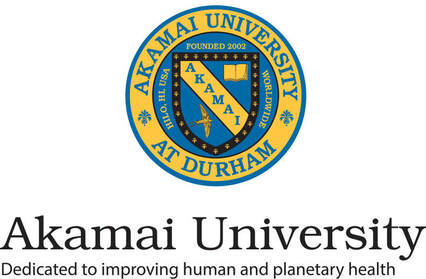
CANADIAN DOCUMENTS
Canadian Policy - When to do Ethics Training Doc
Research or Quality Assurance Decision Tree
Ethical Conduct for Research Involving Humans in Canada
Legally Effective and Prospectively Obtained Informed Consent
Elements of Informed Consent Checklist
Ethical and Practical Considerations of Paying Research Participants
Exemption Infographic
Non-Profit Government Contracts & Grants
Recruitment of Research Subjects
Policy for Protection of Human Subject
Canadian Policy - When to do Ethics Training Doc
Research or Quality Assurance Decision Tree
Ethical Conduct for Research Involving Humans in Canada
Legally Effective and Prospectively Obtained Informed Consent
Elements of Informed Consent Checklist
Ethical and Practical Considerations of Paying Research Participants
Exemption Infographic
Non-Profit Government Contracts & Grants
Recruitment of Research Subjects
Policy for Protection of Human Subject
Europe Research Guiding Documents:
Human Studies Research Ethics Training in UK
For Faculty Investigating Research Misconduct
Animal Research in the UK
Updated FINAL - the Concordat to Support Research Integrity
Human Studies Research Ethics Training in UK
For Faculty Investigating Research Misconduct
Animal Research in the UK
Updated FINAL - the Concordat to Support Research Integrity
On December 20, 2021, the domain name http://www.integrativehealthjournal.online was secured for this innovative journal birth the mission is to inspire and guide us through the state of the world issues transcending the extreme challenges facing us.
What is the world facing or not facing? What will be required to meet the demands worldwide not just in one country, one philosophical paradigm, or one nation? What requirements will be “demanded” to face these challenges to avoid destruction, obliteration, and demise?
LOVE is the answer quotes Dr. Bernie Siegel, MD with co-presenter Dr. Mary Jo Bulbrook, RN on the Wednesday bimonthly series of Bernie & Mary Jo dialogues through Soul2Soul Communication.
Truly something as basic as a one word engine propeller cannot be the answer. But indeed it is. LOVE means “engagement” with another to come together in unity and relationship to “build a new life” that benefits both serving as foundation for a “child” to be conceived, provide an incubation period for growth and development is a safe environment to the “birthing day and time” bringing new life in the world that has a life of its own to be nurtured, co-parented, educated, supported and empowered to eventually stand alone to make her/his contribution.
Issues of self-serving agendas, unbalanced life style without consideration of the impact of action or lack thereof on real issues that are intertwined and integrated with the demands that transcend individual consideration from a me, me, me approach to a us, us, us approach if we are to survive and thrive.
This journal mission includes LOVE directing the issues of surviving and thriving for individuals, families, communities, nations, international with equal rights respected, honored and considered in decision making. Reliance is not on mere “intellectual ego based paradigms”, but multi-dimensional communication and discernment to search, research and practice innovations that the LOVE relationship directs, conceives and births solutions.
This Journal, IHJ has been coming from the LOVE relationships of the Akamai University faculty, students, staff from its founding roots to yesterdays capturing the domain name birthing the formal structure to document through research, education, and practice the expertise of the faculty in partnership with students as equals in this LOVE relationship, each with unique set of gifts of knowledge, experience and dedication to explore what they see is necessary to achieve the mission and help “save individuals, animals, plants, communities, nations, environment and planets.
Navigating and charting unknown territory not one but many approaches and solutions will be explored that fit the “marriage” of partners in this LOVE relationship of faculty – students who embark on the academic journey of discovery to an individual path that benefits not selfish gains, nor humanistic approaches but multi-dimensional inspired compass to guide the path of achievement.
Hence, the description of the Journal is achieved with this “outlandish” simplified wording of complex relationships demanded to achieve the documentation of what took place to guide innovations so the world will survive, thrive and guide the goal to succeed and redirect from the destructive path the world is heading.
Yes, we are “online”. Yes, we must master technology to speak and engage with different languages, races, nationalities, tastes, faith or lack thereof facing challenges to come up with the “how to’s”, “why’s, and “action needed” to achieve “success”. The outcome guides, directs and benefits those we serve.
We are ONE. We are INTERCONNECTED. We are MULTI-DIMENSIONAL. And we can and will succeed.
This is the fuel to the solutions – intention to what we attend to concerning, surviving, thriving and achieving through the unknown territory ahead of us.
What is the world facing or not facing? What will be required to meet the demands worldwide not just in one country, one philosophical paradigm, or one nation? What requirements will be “demanded” to face these challenges to avoid destruction, obliteration, and demise?
LOVE is the answer quotes Dr. Bernie Siegel, MD with co-presenter Dr. Mary Jo Bulbrook, RN on the Wednesday bimonthly series of Bernie & Mary Jo dialogues through Soul2Soul Communication.
Truly something as basic as a one word engine propeller cannot be the answer. But indeed it is. LOVE means “engagement” with another to come together in unity and relationship to “build a new life” that benefits both serving as foundation for a “child” to be conceived, provide an incubation period for growth and development is a safe environment to the “birthing day and time” bringing new life in the world that has a life of its own to be nurtured, co-parented, educated, supported and empowered to eventually stand alone to make her/his contribution.
Issues of self-serving agendas, unbalanced life style without consideration of the impact of action or lack thereof on real issues that are intertwined and integrated with the demands that transcend individual consideration from a me, me, me approach to a us, us, us approach if we are to survive and thrive.
This journal mission includes LOVE directing the issues of surviving and thriving for individuals, families, communities, nations, international with equal rights respected, honored and considered in decision making. Reliance is not on mere “intellectual ego based paradigms”, but multi-dimensional communication and discernment to search, research and practice innovations that the LOVE relationship directs, conceives and births solutions.
This Journal, IHJ has been coming from the LOVE relationships of the Akamai University faculty, students, staff from its founding roots to yesterdays capturing the domain name birthing the formal structure to document through research, education, and practice the expertise of the faculty in partnership with students as equals in this LOVE relationship, each with unique set of gifts of knowledge, experience and dedication to explore what they see is necessary to achieve the mission and help “save individuals, animals, plants, communities, nations, environment and planets.
Navigating and charting unknown territory not one but many approaches and solutions will be explored that fit the “marriage” of partners in this LOVE relationship of faculty – students who embark on the academic journey of discovery to an individual path that benefits not selfish gains, nor humanistic approaches but multi-dimensional inspired compass to guide the path of achievement.
Hence, the description of the Journal is achieved with this “outlandish” simplified wording of complex relationships demanded to achieve the documentation of what took place to guide innovations so the world will survive, thrive and guide the goal to succeed and redirect from the destructive path the world is heading.
Yes, we are “online”. Yes, we must master technology to speak and engage with different languages, races, nationalities, tastes, faith or lack thereof facing challenges to come up with the “how to’s”, “why’s, and “action needed” to achieve “success”. The outcome guides, directs and benefits those we serve.
We are ONE. We are INTERCONNECTED. We are MULTI-DIMENSIONAL. And we can and will succeed.
This is the fuel to the solutions – intention to what we attend to concerning, surviving, thriving and achieving through the unknown territory ahead of us.
Launching 2024 Scholarship of Faculty & Students
Check out Dr. Medani Bhandari, Senior Vice President New Books:
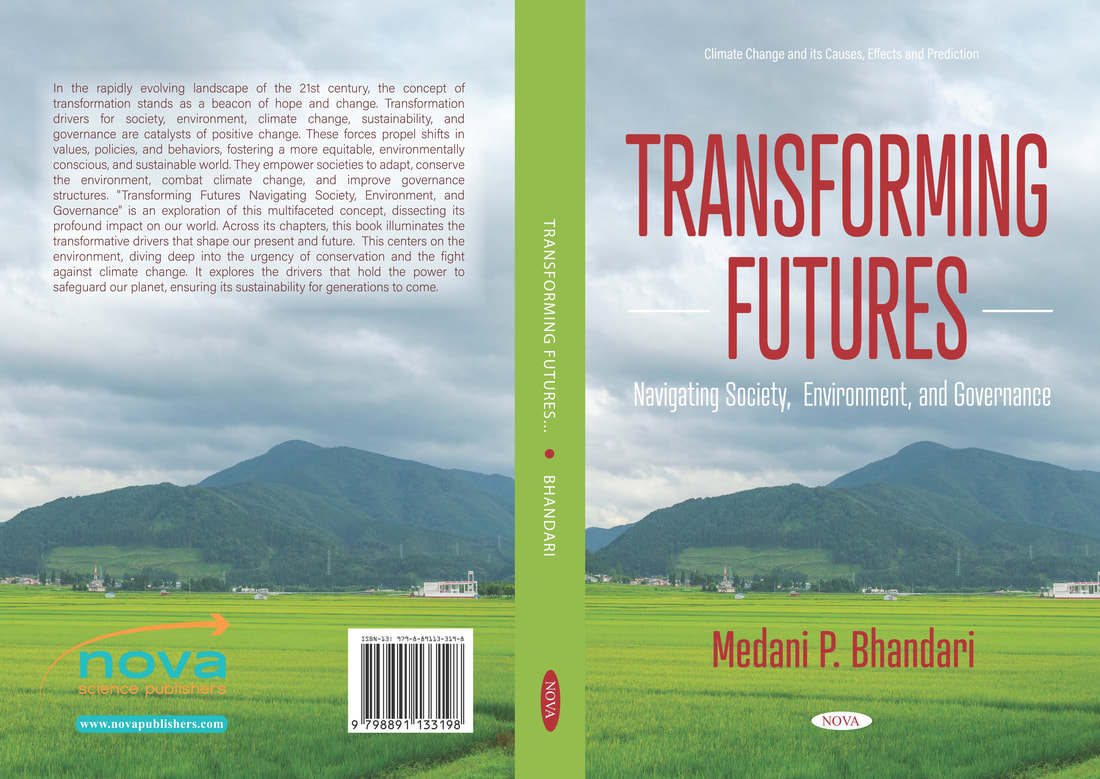
“Transforming Futures: Navigating Society, Environment, and Governance” holds profound relevance amidst ongoing discussions concerning sustainability and environmental preservation. It directly addresses the pressing issues of our time, including:
- The Transformation Drivers to Foster Environment Conservation and Mitigate Climate Change
- Drivers for Social Transformation – Understanding and Measurement
- The Transformation Drivers to Foster Humanity
- The Essence of Transformation Within and Beyond
- The Future of Transformation Drive
Published December 2023. Available through Nova. Here is the link: novapublishers.com/shop/transforming-futures-navigating-society-environment-and-governance/
“Live and Let Others Live” is profoundly relevant amid current debates on sustainability and environmental conservation. It addresses the urgent challenges of climate change, deforestation, and species loss, emphasizing the imperative of coexisting harmoniously with nature. This philosophy underscores the vital need to safeguard our planet’s fragile ecosystems, promote responsible consumption, and preserve biodiversity. It resonates with contemporary dialogues on sustainable living, climate action, and global initiatives to address environmental crises, making it a highly pertinent and timely subject in our world today.
Published December 18, 2023. Available through Nova. Here is the link: novapublishers.com/shop/live-and-let-others-live-in-reference-to-sustainability-and-environment-conservation/
Published December 18, 2023. Available through Nova. Here is the link: novapublishers.com/shop/live-and-let-others-live-in-reference-to-sustainability-and-environment-conservation/
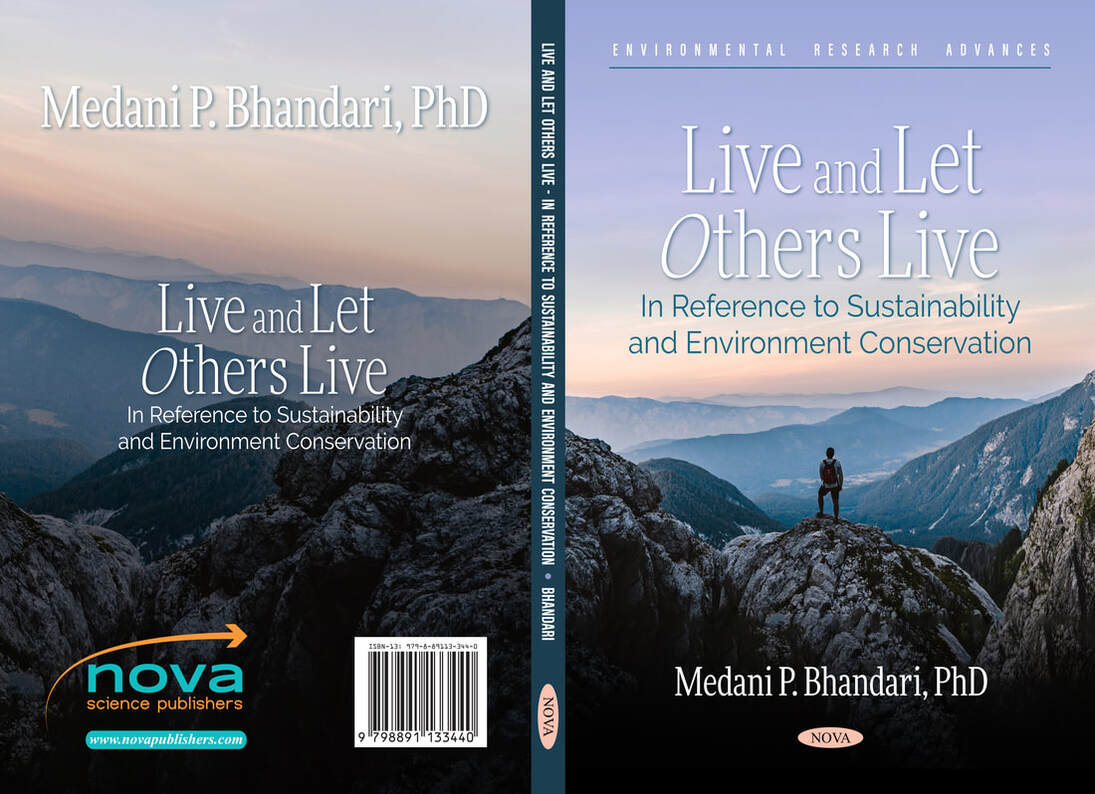
Volume 22 Number 2 (November/December 2021)
An Interdisciplinary Journal of Research, Theories, and Observations
The Pacific Journal of Science and Technology (PJST) is a peer-reviewed electronic journal of interdisciplinary scientific research, theories, and observations. PJST is a semi-annual publication of Akamai University (Hilo, HI and Durham, NC). The mission of this journal is to provide a non-commercial platform for the dissemination of scientific research and theory across the academic disciplines. We seek to facilitate greater communication between the scientific assembly at Akamai University and the larger scientific community. To this end, the PJST provides a platform for research conducted both inside and outside of our university. As a non-profit institute of higher learning, Akamai University seeks no distribution or subscription fees from the PJST. The journal is provided strictly in the spirit of academic and scientific discourse and in support of our institutional mission of improving the human condition.
An Interdisciplinary Journal of Research, Theories, and Observations
The Pacific Journal of Science and Technology (PJST) is a peer-reviewed electronic journal of interdisciplinary scientific research, theories, and observations. PJST is a semi-annual publication of Akamai University (Hilo, HI and Durham, NC). The mission of this journal is to provide a non-commercial platform for the dissemination of scientific research and theory across the academic disciplines. We seek to facilitate greater communication between the scientific assembly at Akamai University and the larger scientific community. To this end, the PJST provides a platform for research conducted both inside and outside of our university. As a non-profit institute of higher learning, Akamai University seeks no distribution or subscription fees from the PJST. The journal is provided strictly in the spirit of academic and scientific discourse and in support of our institutional mission of improving the human condition.
Table of Contents (Vol. 22, No. 2)
Call for Papers **Submission Window for Spring Issue Opens December 28, 2021 (0900hr ET US)**
Referenced Papers
Engineering and Material Science
Energy and Power
Physics, Atmospheric Physics, and Health Physics
Mathematics and Statistics
Information Technology and Communications
Management, Economics, and Education
Chemistry and Biochemistry
Life Sciences and Medicine
Environmental Science and Ecology
Geology, Geophysics, and Earth Science
Disclaimer: The opinions, claims, and conclusions expressed in the articles published in the Pacific Journal of Science and Technology are those of the authors. They do not necessarily reflect the views or opinions of the Pacific Journal of Science and Technology, its editors, Akamai University, its administration, or Board of Directors. The research and theories presented in these articles are solely the claims of the contributing author(s). The Pacific Journal of Science and Technology assumes no responsibility for damages; real or imagined, arising from the use or misuse of information contained in these articles. The Pacific Journal of Science and Technology is provided free to the community as a public service of Akamai University. No part of this journal shall be considered as promotional material or solicitation. The Pacific Journal of Science and Technology is best viewed with Internet Explorer version 7.0 or better. The International Standard Serial Number (ISSN) for PJST is 1551-7624. Copyright 2004-2022; Akamai University. All rights reserved.
Call for Papers **Submission Window for Spring Issue Opens December 28, 2021 (0900hr ET US)**
Referenced Papers
Engineering and Material Science
- Development and Quality Evaluation of Cubing Machine for Fermented African Locus Beans: Musa Omotayo Jimoh, Ph.D. and Abdulwasiu Ahmed Adeyinka, B.Tech.
- Design and Fabrication of a Low Cost Roasted Groundnut Seed Dehuller. Abiodun Samson Olubo, M.Engr.; Joseph Temitope Stephen, Ph.D.; Opeyemi Olusegun Opadotun, M.Tech. (in View); J.A. Adebija, M.Engr.; Adeyinka Adebayo, Ph.D.; and G.J. Adeyemi, Ph.D.
- Study of Moringa oleifera and Vitex doniana Sweet Leaf Extracts for use as Eco-friendly Corrosion Inhibitors in NaOH. H.K. Idu; N.E. Idenyi; E.I. Ugwu; and D.U. Onah.
Energy and Power
- Functional Relationship between the Energy Consumption and the Greenhouse Gas Emissions in Nigeria. Huzaifa Aliyu Babando, M.Sc. and Odekunle Remilekun Mathew, Ph.D.
Physics, Atmospheric Physics, and Health Physics
- No Sense of Einstein's Principles of Relativity and the Origin of a New Relativity. Fernandes, José Luís Pereira Rebelo, Eng.
Mathematics and Statistics
- Application of Least Squares Method for Solving Volterra Fractional Integro-Differential Equations Based on Constructed Orthogonal Polynomials. M.O. Ajisope, Ph.D.; A.Y. Akinyele, Ph.D.; C.Y. Ishola, Ph.D.; A.A. Victor, M.Sc.; M.L. Olaosebikan, M.Sc.; and T. Latunde, Ph.D.
- Complementary Generalized Transmuted Poisson Lomax Distribution with its Derived Properties and Application. S.A. Taiwo and A.A. Akomolafe.
- Comparison of Some Robust Estimators in Multiple Regression in the Presence of Outliers. Gafar Matanmi Oyeyemi, Ph.D.; David Adashu Aji, M.Sc.; Adijat Bolanle Ibraheem, Ph.D.; and Akeem Olawunmi Kareem, Ph.D.
- Transmission Dynamics of a SIR Infectious Disease Model using Multi-Step Homotopy Analysis Method. H.O. Edogbanya, Ph.D.; S.O. Momoh, Ph.D.; T.A. Ayoola, M.Sc.; A.A. Victor, M.Sc.; M.O. Ajisope, Ph.D.; and A.A. Ayoade, Ph.D.
Information Technology and Communications
- Investigation on Effect of Homogenous Multiple Lines of Trees on Wireless Communication System. O. Olabisi, Ph.D.; A.O. Adeniran, Ph.D.; A.G. Ebisemiju; and S.O. Areo.
Management, Economics, and Education
- Precision Farming, Soil Conservation, and Irrigation as Veritable Impetus for Boosting Agricultural Productivity. O.E. Omofunmi, Ph.D. and K.S. Ogunleye, Ph.D.
- Socio-Economic Factors Influencing Quantity of Insecticide Use in Cowpea Production in Nigeria. I.A. Ayinde, Ph.D.; A.O. Ayegbokiki, M.Agric. (in view); and F.O. Aminu, Ph.D.
- Sibling Rivalry and Succession Planning in Family Business in Nigeria. Nkiruka E. Ifekwem; Samuel Taiwo Olabosinde; and Oghenetega O. Amuah.
- The Challenges and Prospects of Secretarial Profession in this Modern Technology Era in Oyo State Nigeria. Dr. Ayinde Duda Oladeji and Oluwatunmise Ayo Afolabi.
- Continuing Education: A Strategy for Achieving Educational Transformation for Sustainable National Development in Nigeria. Ifeanyi David Emeka, Ph.D. and Edith Chin Thompson, Ph.D.
- Canadian Victory on Vimy Ridge: The Creation of the Creeping Barrage and the Defining Moment of a Nation. Timothy C. Chapman, B.A.; Peter A. Johnson, M.Sc.; John C. Johnson, B.Sc.(Hons); and Austin A. Mardon, Ph.D.
- Assessment of Financial Reporting Quality of Federal Universities in Nigeria: A Case Study of the Federal University of Agriculture, Abeokuta. Abiodun Situ, M.Sc. and Funmilola Omilabu, B.Sc.
Chemistry and Biochemistry
- Bioactive Profiling of Vitex doniana Leaf and its Effect on Rat Erythrocyte Membrane Stabilization Activity. Odika Prince, Ph.D.; Duru Majesty, Ph.D.; Onyeabor Chimaraoke, Ph.D.; Nana Obedience, MSc.; Egbachukwu Simon, Ph.D.; Nwadike Constance, Ph.D.; and Okafor Polycarp, Ph.D.
- Kinetic, Isothermal, and Thermodynamics Studies of the Biosorption of Pb (II) from Aqueous Solution by White Star Apple (Chrysophyllum albidum G.) Seed Shells. F.A. Busari, M.Sc.; S.B. Adekoya, M.Sc.; M.B. Adebo, M.Sc.; S.R. Oyefeso, B.Sc.; S.A. Sigbeku, B.Sc.; and M.E. Oladele, B.Sc.
Life Sciences and Medicine
- Evaluation of Density and Anatomical Properties of Stem Wood of Five Commercial Trees in Nigeria using a Non-Destructive Approach. K.M. Ogunjobi, Ph.D.; K.O. Okunola; V.A. Jayeola; A.C. Adetogun, Ph.D.; and O.F. Gakenou.
- Proximate Composition and Public Perception of Variegated Grasshoppers (Zonocerus variegatus) as a Source of Animal-Based Protein. Oladapo O. Oduntan, Ph.D. and Mark Morgan, Ph.D.
- Survey of Endo-Parasite Composition of Selected Wildlife Species and their Economic Importance. Oladapo O. Oduntan, Ph.D. and Adebowale K. Taiwo, M.Sc.
- Self-Efficacy, Emotional Intelligence, and Locus of Control as Predictors of Substance Abuse amount Undergraduates in Nigeria. Kamoru Abidoye Tiamiyu and Busayo Omolade Ajibola.
Environmental Science and Ecology
- Evaluating Threats and Conservation Status of South African Rhynchosia. Samuel O. Bamigboye, Ph.D. and Muhali O. Jimoh, Ph.D.
- Remediation Potential of Jatropha integerrima (Jacq) in Lead Contaminated Soil. O.O. Akintola; J.T. Arojojoye; M.O. Ojo; and R.T. Ibode.
- Assessment and Analysis of the Presence of Heavy Metals in Water in Ara and Laminga of Nasarawa State, Nigeria: Health Implication on the Populace Rilwan Usman; Aliyu Muhammad Kamal; Emmanuel I. Ugwu; Idris M. Mustapha; Adamu Mamman; and Abdulrahman Hudu.
- Influence of Wastes on Some Properties of Soil around Ajakanga Dumpsite in Ibadan, Southwestern Nigeria Oluwatoyin Opeyemi Akintola; Bolanle L. Olajiire-Ajayi; Rebecca Titilayo Ibode; and Olatunji David Ayeni.
- Removal of Heavy Metals from Aqueous Solutions using Modified Irish Potato Leaf as Low Cost Biosorbent: Kinetic and Thermodynamic Studies Abimbola A. Ogundiran M.Sc.; N.A. Adesola Babarinde Ph.D.; Edwin A. Ofudje Ph.D.; and Olusegun O. Ogundiran Ph.D.
- The Impact of Solid Waste Dumpsites on Ambient Air Quality in Obio/Akpor Local Government Area, Rivers State: A Case Study of Nkpolu Community.Jonah Justice Uche.
- Mathematical Modeling of Ecological Restoration of Gully Erosion in Chukun Local Government Area in Kaduna State A.M. Badmus; B.B. Alhaji; and N. Abdullahi.
Geology, Geophysics, and Earth Science
- On the Application of the Magnetic Method in the Mapping of Mineralized Pegmatites in Mica Schist underlain Basement Complex of Southwest Nigeria. Martins O. Olorunfemi, Ph.D.; Ademakinwa G. Oni, Ph.D.; Taiwo K. Fadare, M.Sc.; and Oluwaseyi E. Olajuyigbe, M.Sc.
Disclaimer: The opinions, claims, and conclusions expressed in the articles published in the Pacific Journal of Science and Technology are those of the authors. They do not necessarily reflect the views or opinions of the Pacific Journal of Science and Technology, its editors, Akamai University, its administration, or Board of Directors. The research and theories presented in these articles are solely the claims of the contributing author(s). The Pacific Journal of Science and Technology assumes no responsibility for damages; real or imagined, arising from the use or misuse of information contained in these articles. The Pacific Journal of Science and Technology is provided free to the community as a public service of Akamai University. No part of this journal shall be considered as promotional material or solicitation. The Pacific Journal of Science and Technology is best viewed with Internet Explorer version 7.0 or better. The International Standard Serial Number (ISSN) for PJST is 1551-7624. Copyright 2004-2022; Akamai University. All rights reserved.
Pacific Journal of Science and Technology
An Interdisciplinary Journal of Research, Theories, and Observations
Volume 22, Number 1 (May/June 2021) A Semi-Annual Publication of Akamai University. Click here to view.
Search Archives The Pacific Journal of Science and Technology (PJST) is a peer-reviewed electronic journal of interdisciplinary scientific research, theories, and observations. PJST is a semi-annual publication of Akamai University (Hilo, Hawaii and Durham, North Carolina). The mission of this journal is to provide a non-commercial platform for the dissemination of scientific research and theory across the academic disciplines. We seek to facilitate greater communication between the scientific assembly at Akamai University and the larger scientific community. To this end, the PJST provides a platform for research conducted both inside and outside of our university. As a non-profit institute of higher learning, Akamai University seeks no distribution or subscription fees from the PJST. The journal is provided strictly in the spirit of academic and scientific discourse and in support of our institutional mission of improving the human condition.
Journal Links Click Here

Research Journals
|
Pacific Journal of Science and Technology
The Pacific Journal of Science and Technology (PJST) is a peer-reviewed electronic journal of interdisciplinary scientific research, theories, and observations. PJST is a semi-annual publication of AU, Hilo, Hawaii. The mission of this journal is to provide a non-commercial platform for the dissemination of scientific research and theory across the academic disciplines. We seek to facilitate greater communication between the scientific assembly at Akamai University and the larger scientific community. To this end, the PJST provides a platform for research conducted both inside and outside of our university. As a non-profit institute of higher learning, Akamai University seeks no publication or distribution fees from the PJST. The journal is provided strictly in the spirit of academic and scientific discourse and in support of our institutional mission of improving the human condition. |
Journal for Advancement of the Human Condition
This journal is published online by Akamai University for and on behalf of its graduate students by recommendations from faculty. Articles are selected which have potential to contribute toward amelioration of major world problems and sustainability of the planet. Articles are included from the fields of Applied Psychology, Integrative Psychology, Transpersonal Psychology, Applied Ecopsychology, Business Administration, Economic Development, Environmental Studies, Education and Literacy, Public Health Administration, Complementary Therapies, Energy Medicine, Integral Health Studies, Peace, Diplomacy and International Relations, and Sustainability Studies.
|
Scholarly Contributions Ukraine Sumy State University
Professor Medani P. Bhandari & Associate Professor Shvindina Hanna
Two new books by these authors. Dr. Bhandari currently is faculty with AU as well. We welcome his many gifts to our community.
Research Courses
Within certain limitations, the following research preparation courses are available across the University. Students are asked to consult with their primary mentor in selection of research coursework.
- RES 500: Survey of Research Methods (3 credits) Inspects the foundational techniques of scholarly research. Topics explore sources of scholarly research literature, proper methods for evaluating research reports, fundamentals of qualitative and quantitative research, as well as participatory action research methods.
- RES 502: Understanding Research Journal Articles (3 credits) Empowers students in assessing the effectiveness of research papers from professional journals. Topics investigate the rigor of various research methods, replicability, bias and validity issues, and the appropriateness of statements of findings and recommendations from research. Students study effectiveness and problems in collecting, analyzing, and interpreting data from studies and investigate the applicability and generalization of findings and the proper manner of presenting the details of their own research studies.
- RES 504: Introductory Research Statistics (3 credits) Covers the basic statistical concepts, theory and methods in statistical research. Topics include variables, graphs, frequency distributions, measures of central tendency, measures of dispersion, probability theory, binomial, normal and Poisson distributions, statistical sampling theory, and statistical decision theory.
- RES 506: Advanced Research Statistics (3 credits) Covers parametric and nonparametric hypothesis testing. Topics include sampling theory, Chi-square test, least squares regression, correlation theory, non-linear regression, analysis of variance, Student's t-test, and various methods in nonparametric analyses.
- RES 508: Qualitative Reasoning and Analysis(3 credits) Provides detailed study of qualitative research methods. Topics survey historical and theoretical foundations of qualitative research, explore major qualitative research strategies, and build an understanding of the art and science of collecting, analyzing, and interpreting qualitative information. The course provides background on applied qualitative research, the politics and ethics of qualitative inquiry, and the major paradigms that inform and influence qualitative research.
- RES 510: Participatory Action Research (3 credits) Provides the foundational principles of participatory action research. Topics survey theoretical foundations of action research, the methodology and applications of PAR in contemporary culture. Students assess the rigor and usefulness of participatory action research in addressing major world problems.
- RES 512: Effective Data Analysis (3 credits) Examines modern scientific data analysis including the elements of effectiveness in study design, data gathering, processing of statistics and interpretation of findings.
- RES 520: Social Science Research Methods (3 credits) Examines essential issues in social science research. Topics include assessment of data gathering techniques using selected case studies from journal articles. Students learn to measure attitudes and performance, use tests in data gathering, contrast and compare uses of statistical and qualitative methods, and evaluate focus group research.
- RES 526: Biological Illustration (3 credits) Investigates in detail the skills of drawing and painting by hand or camera lucida, photographic methods, video and digital imaging in biological illustration.
- RES 527: Biological Modeling (3 credits) Explores the analytical and quantitative approaches to the study of biological systems. Topics include fitting data to models, dynamics of systems, transects, random sampling, coring, volumetric measurements, tracking and global positioning. This course presents different mathematical and statistical approaches including deterministic, chaotic, stochastic as well as discrete and continuous models.
- RES 528: Environmental Science Research Methods (3 credits) Investigates the application of knowledge and understanding to problems of original research in environmental studies. Topics distinguish and interpret the differences among research paradigms and methods. Students review essential principles of ecological problems and how they are approached, the minimal requirements of experimental design in ecology, trade-offs in ecological experimentation. Students analyze current literature, critique existing research methodologies and studies, develop practical research skills, and formulate approaches to scholarly research., and prepare a scholarly paper.
- RES 529: Calculus for Environmental Science (3 credits) Covers the fundamental topics of derivatives and integrals with emphasis on methods and applications. It is especially directed towards environmental studies in order to provide a valuable and useful device to help solve problems.
- TPP 653: Transpersonal Psychology Research Methods (3 credits) Offers an in-depth study of transpersonal research methods. Students begin by surveying the basic facets of both qualitative and quantitative research methods, and then focus upon a number of transpersonal research methodologies. The course concludes with the student choosing a transpersonal research methodology to study in more depth that is related to the student's intentions for his/her masters thesis or doctoral dissertation. Throughout the course, students will explore major transpersonal research strategies, and build an understanding of the art and science of collecting, analyzing, and interpreting transpersonal materials. The course also provides background on applied transpersonal research and the major paradigms that inform and influence transpersonal research.


